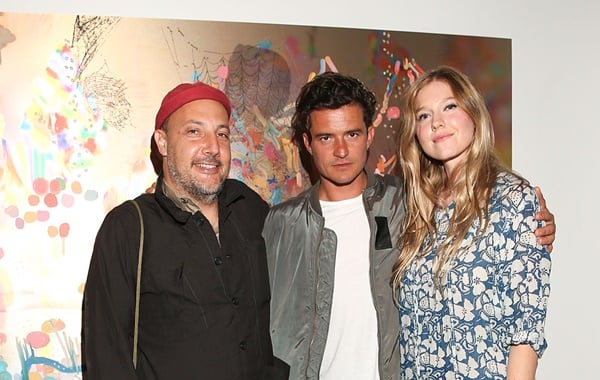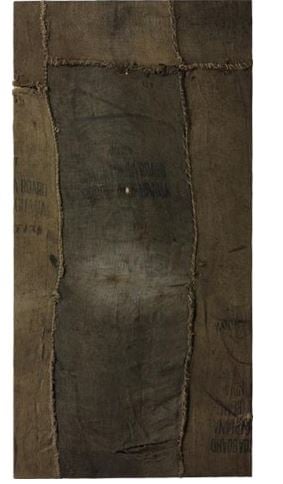Art & Exhibitions
Stefan Simchowitz Fires Back at Ibrahim Mahama in Nasty, Ongoing Dispute
Simchowitz calls it "atrocious and insulting."

Simchowitz calls it "atrocious and insulting."

As the youngest artist chosen to participate by esteemed curator Okwui Enwezor at the 2015 Venice Biennale, 28-year-old Ghanaian artist Ibrahim Mahama seemed to have a bright future ahead of him. But Mahama is now confronting a deal gone sour with two prominent members of the art world when he provided collector Stefan Simchowitz and art dealer Ellis King with raw material for artworks in exchange for a six-figure payment. When Mahama disavowed a group of works that Simchowitz and King had assembled into artworks that were then put up for sale, Simchowitz and King filed suit. The artist countersued in late March, and Simchowitz is firing back.
“The way this whole thing has gone down has been so atrocious and insulting,” said Simchowitz, who was in LA, in a phone call with artnet News. “This gets converted in the New York press into a mutated story, this rich white Jewish South African collector and this poor oppressed artist.”
Mahama filed his suit on March 23 in US District Court for the Central District of California—the same court in which Simchowitz and King sued Mahama this past June. The artist’s claims include: protection under the Visual Artists Rights Act (VARA) of 1990; breach of contract; invasion of privacy (appropriation of Plaintiff’s likeness for Defendant’s advantage); unfair business practices; and international interference with prospective economic advantage.
In late 2013, Mahama’s suit states, Simchowitz and King contacted the artist by email expressing their interest to work with him. The artist “informed King that his primary interest was in displaying his works to the public, and not in selling them as King had been proposing.” But “on September 29, 2013, King sent Mahama an email offering to buy a 20′ x 60′ jute coal sack piece for £5,000,” according to Mahama’s claim, and he accepted.
Their relationship continued over the next several months, with King buying Mahama camera equipment in London, where the artist was involved in a residency, offering space to store works, and discussing the idea for a show at his gallery, the complaint states. The artist became increasingly concerned about stretching works and offering them for sale, including fears about placing too much work on the market.
In May 2015, when Mahama learned that King and Simchowitz allegedly were selling his artworks “without any authorization,” Mahama wrote King a letter stating that “use of parts of the installation under the copyright/artist’s terms is illegal and forbidden… The artist respectfully requests that you cease and desist.”
A month later, Simchowitz and King sued Mahama for breach of contract, fraudulent inducement, commercial disparagement, and unfair competition, among other claims. They had paid him a total of $150,000 for jute sacks, which they then cut into pieces to sell to collectors, as well as two larger jute sack installations. However, the artist claims to want the “works [to] be presented whole,” as it states in the suit, “but Counter Defendants mutilated them by cutting them up, and stretching and framing them as individual pieces to sell, all without any required written authorization from Mahama.”
Simchowitz and King claim “that the artworks … are worth approximately $4.5 million,” Mahama’s suit notes.
Both sides paint a picture of an art patronage relationship fraught with tension, where King and Simchowitz’s visions clashed with Mahama’s attempts to maintain control over how his material was handled and sold.

LOS ANGELES, CA – JULY 09: Stefan Simchowitz, actor/producer Orlando Bloom and artist Petra Cortright attend the Depart Foundation’s public opening and reception of “Petra Cortright: Niki, Lucy, Lola, Viola” on July 9, 2015 in Los Angeles, California.
Photo by Rochelle Brodin/Getty Images for Depart Foundation.
Simchowitz countered Mahama’s version of the individual jute works, saying, “They’re goddamned signed and titled and dated,” adding that Mahama flew to Dublin to do this. “He’s refusing to authenticate anything. He received $150,000. He signed the back of the stretcher bars, on the works, when they were finished over two days. He came back a second day to finish signing them.”
The collector argued that the roughly $1,000 that Mahama was paid for each work represents a drastic markup from the jute sacks he acquires at markets in Ghana.
“It wasn’t lost on people that Ibrahim bought these for pennies,” Simchowitz says of the jute sacks. “He made $150,000 and he’s basically saying, ‘Go fuck yourself.'”
In his suit, Mahama says he “questioned Simchowitz’s involvement as Mahama was aware of Simchowitz’s reputation within the art community…In his eyes, Simchowitz only cared about money, and that was at odds with Mahama’s philosophy.”

Ibrahim Mahama, Untitled (2014), sold at Phillips this past June for $20,000 (estimate: $16–23,000).
To date, the artnet Price Database lists three works by Mahama that were offered at auction, with mixed results. These include an untitled 2014 combination of jute coal sacks sold for $20,000 at Phillips London this past June (estimate: $16,000–23,000). The provenance says it was acquired directly from the artist by Simchowitz.
Simchowitz told artnet News that Mahama had attempted to stop at least one of the sales at Phillips by emailing the auction house to state that the work was inauthentic and should be removed from auction.
“Phillips checked with their general counsel. They turned the work around and saw Ibrahim’s signature, date and title. They kept it in the auction,” Simchowitz said. “This is an authentic object. Because an artist states after the fact that this is inauthentic, this is not the case. It’s something he signed and received payment for.”
“We are not a party to this litigation so it would be inappropriate for us to comment,” said Phillips spokesman Michael Sherman. “Should any claim as to title or authenticity arise, however, Phillips takes such claims seriously and evaluates each claim on its merits as part of its due diligence process.”
The second auction is of an untitled 2014 combination of jute coal sacks sold at Phillips New York this past September for $10,000 (estimate: $12,000–15,000); and an untitled 2014 combination of jute coal sacks offered at Phillips “New Now” sale this past February was priced at $8,000–12,000, but failed to sell.
Neither Mahama’s attorney nor Ellis King responded to artnet News’ request for comment.